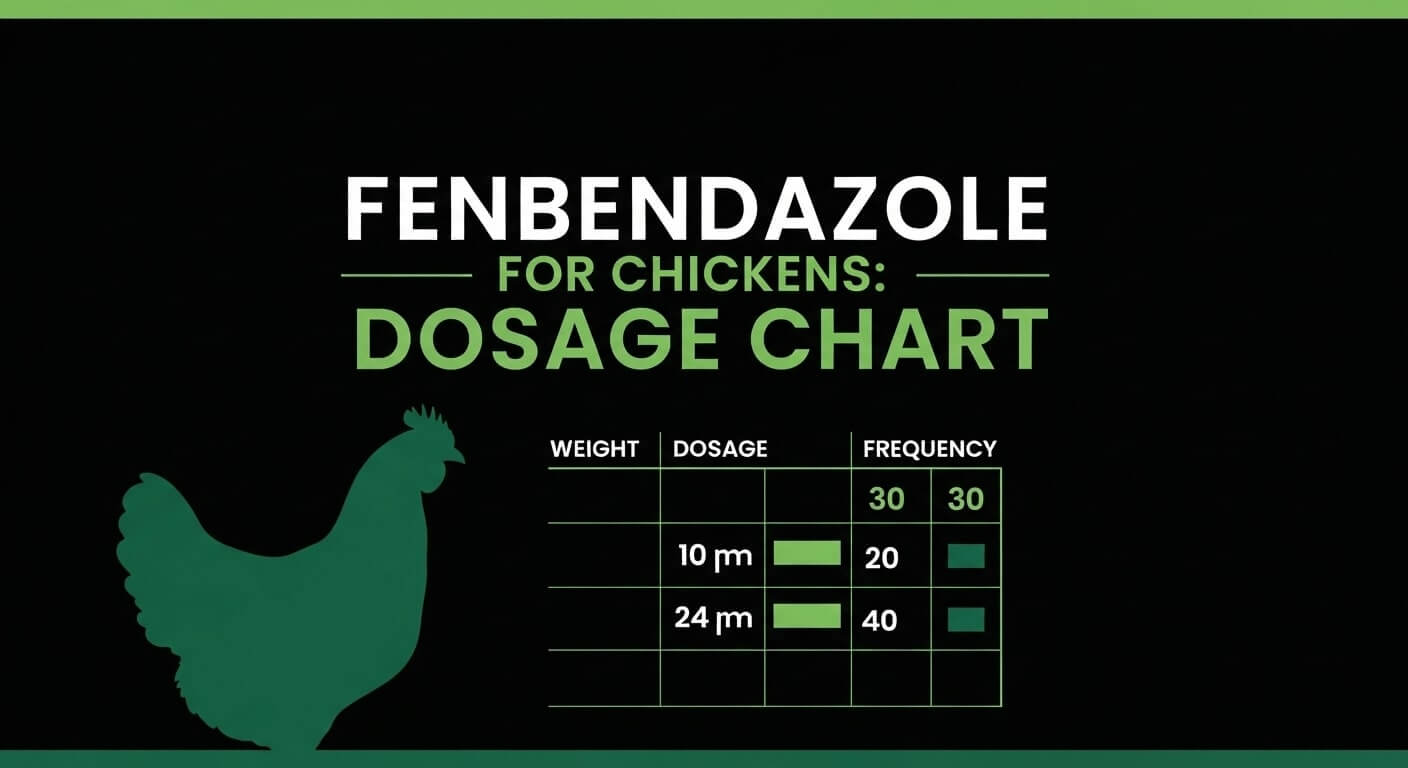
Fenbendazole for Chickens Dosage Chart – Poultry health is a top priority for backyard chicken keepers and commercial farmers alike. One common issue that affects chickens is parasitic infections, particularly worms. Fenbendazole is a highly effective dewormer used to treat various internal parasites in chickens. In this comprehensive guide, we’ll cover everything you need to know about fenbendazole for chickens dosage chart, including administration, safety, and best practices.
What Is Fenbendazole?
Fenbendazole is a broad-spectrum anthelmintic (deworming) medication belonging to the benzimidazole class. It is effective against:
- Roundworms (Ascaridia spp.)
- Capillary worms
- Tapeworms (in some cases)
- Gapeworms (Syngamus trachea)
It works by disrupting the parasites’ energy metabolism, leading to their death. Fenbendazole is safe for chickens when used correctly, making it a popular choice among poultry owners.
Why Use Fenbendazole for Chickens?
Internal parasites can severely impact a chicken’s health, leading to:
- Weight loss
- Reduced egg production
- Diarrhea
- Lethargy
- Increased susceptibility to other diseases
Regular deworming with fenbendazole for chickens helps maintain a healthy flock and prevents parasitic infestations.
Fenbendazole for Chickens Dosage Chart
Administering the correct dosage is crucial to ensure effectiveness and avoid toxicity. Below is a detailed fenbendazole for chickens dosage chart based on weight and formulation.
1. Liquid Fenbendazole (10% Solution)
| Chicken Weight (lbs) | Dosage (ml) |
|---|---|
| 2 lbs (Bantams) | 0.1 ml |
| 4 lbs | 0.2 ml |
| 6 lbs | 0.3 ml |
| 8 lbs | 0.4 ml |
| 10 lbs | 0.5 ml |
2. Fenbendazole Powder/Granules
For powdered fenbendazole (often 22.2% concentration), mix with feed:
- Dosage: 1 lb (454g) of medicated feed per 100 lbs of body weight
- Treatment Duration: 5-7 days
3. Safeguard® Goat Dewormer (10% Fenbendazole Paste)
- Dosage: 0.23 ml per 10 lbs of body weight
- Administer: Directly into the beak or mixed with a small amount of feed
How to Administer Fenbendazole to Chickens
1. Oral Administration (Liquid/Paste)
- Use a syringe (without a needle) to measure the exact dose.
- Gently hold the chicken’s beak open and administer the liquid at the back of the throat.
- Ensure the chicken swallows the medication.
2. Medicated Feed Method
- Mix fenbendazole powder thoroughly with feed.
- Ensure all chickens consume the medicated feed for 5-7 days.
- Remove other food sources to ensure proper intake.
3. Water Soluble Fenbendazole
- Some formulations can be added to drinking water.
- Follow manufacturer instructions for accurate dilution.
Safety and Precautions
- Do not overdose: Excessive fenbendazole can cause toxicity.
- Egg withdrawal period: Avoid consuming eggs for 14 days after treatment.
- Not for meat birds close to slaughter: Check withdrawal periods if raising chickens for meat.
- Repeat treatment if needed: Severe infestations may require a second dose after 10-14 days.
Signs of Worm Infestation in Chickens
Before using fenbendazole for chickens, confirm if your flock has worms by watching for:
- Pale combs and wattles
- Weight loss despite normal eating
- Diarrhea or bloody droppings
- Visible worms in feces
- Reduced egg production
Frequently Asked Questions (FAQs)
1. How often should I deworm my chickens?
- Preventative deworming: Every 3-6 months
- Heavy infestations: Treat immediately and repeat in 10-14 days
2. Can I use fenbendazole for chicks?
- Yes, but at a reduced dosage (consult a vet for precise measurements).
3. Is fenbendazole safe for laying hens?
- Yes, but eggs should not be consumed for 14 days post-treatment.
4. Where can I buy fenbendazole for chickens?
- Farm supply stores, online retailers, and veterinary clinics.
Conclusion
Using fenbendazole for chickens dosage chart correctly ensures a healthy, parasite-free flock. Always follow the recommended dosages, monitor your chickens for signs of improvement, and practice good coop hygiene to prevent reinfestation. By incorporating fenbendazole into your poultry care routine, you can keep your chickens thriving and productive.
For more poultry health tips, stay tuned to our blog!


Ronald
November 7, 2025Very Informative & an easy read.